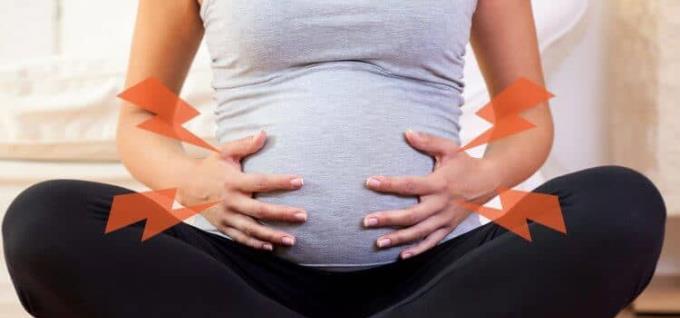Circular ligament pain tends to appear around the second trimester of pregnancy. The area that arises is usually the lower abdomen or groin. This symptom can go away on its own or go away when pregnant women rest.
According to statistics from obstetrics specialists, 10-30% of pregnant women present with round ligament pain. Many pregnant women begin to experience these pains during the second trimester of pregnancy. Besides, most people feel obvious round ligament pain. The pain area is usually the lower abdomen or groin.
Although harmless, but symptoms of round ligament pain can make many pregnant women feel depressed and uncomfortable. So, do you know how to alleviate this ligament pain? Let's learn with aFamilyToday Health through the following article.
What is round ligament pain?
One of the most common discomfort during pregnancy is round ligament pain.
The circular ligament is two bands of connective tissue on either side of the uterus. They are responsible for connecting the uterus with the groin and pubic area. As the uterus develops during pregnancy, the circular ligament relaxes to a certain extent to accommodate the growing fetus. At this point, your abdomen will become tight. Therefore, each step of pregnancy can cause the round ligament to contract, causing uncomfortable pain.
Usually, only pregnant women get this condition. However, round ligament pain is still at risk in people with endometriosis.
You may be interested in: Endometriosis: How to relieve pain?
Round ligament pain sensation
Many pregnant mothers describe the feeling of pain arising from stretching round ligaments as if suffering a "punch of a thousand pounds" in the abdomen. These pains may start or get worse with every move of the mother. Some actions, such as rolling back and forth in bed or standing up too fast, are also at risk of flare-ups.

Circular ligament pain can move up or down in the area from the hip to the groin. Pregnant women often experience pain in the lower abdomen or pelvis. However, some people experience pain on the left or both sides.
Causes of round ligament pain
When a woman is not pregnant, the round ligament that supports the uterus is usually short, sturdy and flexible. Conversely, when the fetus appears, these strips of tissue will expand, thicken and stretch like a rubber band. At this point, the amount of pressure on the circular ligaments is so great that they can contract quickly. This can affect nerve endings, leading to unwanted pain.
Some movements that often cause round ligament pain in pregnant women to arise, include:
Walk
Roll over and over on the bed
Stand up quickly
Cough
Sneezing
Laugh more
Some other sudden movements
How to alleviate round ligament pain?

Most cases of round ligament pain go away on their own. However, there are some tips below to minimize the intensity of pain and how often it occurs, such as:
Lie on your side and bend your knees. Be careful to place a soft pillow between your legs and lower abdomen
Slowly change your position or position
Soak in a tub of warm water
Use a heating pad
Use a maternity support belt
Take pain relievers suitable for pregnant mothers
Yoga
Some people report that changing some daily habits such as more rest and less sudden movement will help relieve round ligament pain.
If round ligament pain occurs frequently, talk to your doctor about some mild exercises or ways to alleviate this discomfort.
Circular ligament pain, on the other hand, usually goes away after birth.
When do you need to see a doctor?
In fact, round ligament pain is not such a serious health problem that it requires medical intervention. However, in rare cases, the doctor will need to note pain in the lower abdomen and groin area in pregnant women.
Pregnant mothers should see an obstetrician soon if they experience any of the following symptoms:
Pain in your lower abdomen persists or doesn't go away after you've changed positions
The uterus contracts early
Burning sensation when going to the toilet
Abdominal pain, accompanied by cloudy urine and an unusual odor
Bleed
The amount of vaginal discharge changes abnormally
Fever or chills
Nausea and vomiting
The pelvis is under great pressure
Difficulty walking
These symptoms may represent pelvic pain, not related to the circular ligament.
Other health problems that can cause pain in this area include:
Urinary tract infections
Constipation caused by pregnancy
Appendicitis
Kidney stones
Sexually transmitted disease
Young placenta
Preterm birth













